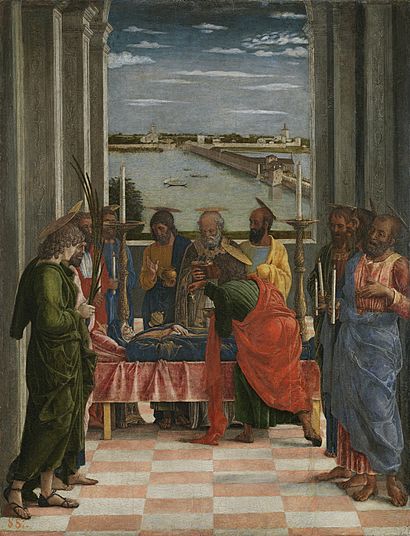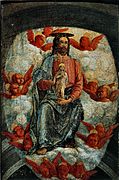Death of the Virgin (Mantegna) facts for kids
Quick facts for kids Death of the Virgin |
|
|---|---|
 |
|
| Artist | Andrea Mantegna |
| Year | 1462–1464 |
| Type | Tempera and gold on panel |
| Dimensions | 54 cm × 42 cm (21 in × 17 in) |
| Location | Museo del Prado, Madrid |
The Death of the Virgin is a famous painting by an Italian artist named Andrea Mantegna. He painted it around c. 1462–1464. This artwork shows the very last moments of the Virgin Mary's life.
What the Painting Shows
Mantegna's painting shows the Virgin Mary at the end of her life. She is lying on a bed in a room with beautiful, old-style architecture. The floor has a pattern of squares that helps your eyes look towards Mary.
In the background, you can see a detailed lake scene. This part of the painting shows a real bridge and town from the Castello di San Giorgio in Mantua, Italy. It's like a window looking out onto a real place.
The Painting's History
This painting was originally made for a chapel inside the Castello di San Giorgio. It was part of a bigger set of artworks. Some other parts of this set are now in different museums.
Three panels are in the Uffizi gallery in Florence. These are called The Adoration of the Magi, The Ascension, and The Circumcision. They are known together as the Uffizi Triptych.
Another part of the original artwork is now in the Pinacoteca Nazionale in Ferrara. This piece is called Christ Bearing the Soul of the Virgin. It shows Jesus with Mary's soul.
It looks like the painting was once bigger than it is today. The top part of the pillars in the painting seems unfinished. The piece showing Christ with the Virgin's soul was probably part of this larger original painting.
See also
 In Spanish: Tránsito de la Virgen (Mantegna) para niños
In Spanish: Tránsito de la Virgen (Mantegna) para niños
- Death of the Virgin (Anonymous)
- Death of the Virgin (Caravaggio)
 | Kyle Baker |
 | Joseph Yoakum |
 | Laura Wheeler Waring |
 | Henry Ossawa Tanner |




